5 Reasons Why Small Businesses Should Invest in Content Marketing

You’ve probably noticed that every website you see nowadays has a blog section. That’s because business owners know the importance of content marketing.
With modern consumers less responsive to traditional marketing forms, providing content that connects with the audience is essential. That also goes double for smaller companies, who don’t have the budget for an expensive ad campaign.
But what exactly is content marketing, why is it so important, and how do you do it?
Read on to find out.
What is content marketing?
Content marketing is the process of producing and distributing written and visual media with a target audience in mind. This material educates and informs people about your brand, products, and services – eventually converting them into long-term customers.
Of course, the overall goal is to increase web traffic and sales. But content marketing isn’t about the hard sell. It’s all about engaging people and positioning your brand as a helpful source of information, demonstrating your expertise without being too promotional.
The content has to be relevant and provides some kind of value to the audience, such as answering their questions or addressing their pain points. In this way, the brand can build trust.
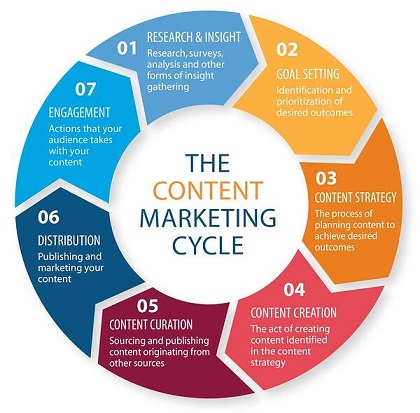
Image Sourced from delloweb.com
5 reasons for small businesses to use content marketing
70% of marketers are now actively investing in content marketing, and it’s not hard to see why. Small businesses, in particular, can benefit from this approach – here are some reasons.
1. It boosts your reputation
When you consistently post informative and authoritative content instead of relying on ads, readers will come to see you as a trusted expert or even an industry leader. For a small business, that’s not to be underestimated.
People will turn to your blog or social media channels when they want to know something – not just about your products but about your industry in general. If you can share your content through third-party publications or form a partnership with influencers, then all the better.
By creating content that meets your audience’s needs, you’re showing that you care about them and have a genuine interest in helping them out. This is a big factor in getting them to do business with you, as the perception of trust extends to your products and services.
Including content marketing in your workflow management software is also an opportunity to differentiate yourself from your competitors and show what makes you special. You can develop a unique brand personality and voice through your style, language, and presentation.
2. It’s an affordable way to generate leads
A positive opinion of your brand has a knock-on effect regarding increasing leads. People are more inclined to buy from a trusted source, especially when that source has proved valuable. Even if you casually refer to your products in a blog, it’s not as blatant as an ad.
Content marketing is far more cost effective than traditional marketing. Because it uses organic methods such as social media and fee-free influencer marketing, you’ll save money by reducing your reliance on paid ads. If you repurpose existing articles and encourage user-generated content, you won’t have to spend so long on content creation.
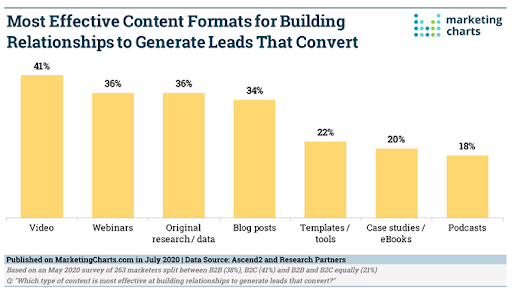
Image Sourced from constantcontact.com
The great thing is that content marketing actually generates more leads – five times more, in fact! It has an important role to play at each stage of the sales funnel, especially if you use it in conjunction with a sales engagement platform.
You can target prospects at the top of the funnel with general information that helps them identify possible solutions for their problems – think blogs, infographics, and newsletters. Leads in the middle of the funnel need a few more details as they narrow their options, such as comparison articles, special offers, and webinars.
Finally, leads at the bottom of the funnel just need a final nudge of encouragement to convert, so content marketing gives them specific details, customer stories, and demos.
3. It helps you build long-term relationships
When readers know that your main aim is to deliver value rather than pushing to get a sale, it’s far easier to build a great relationship with them. That means retaining them for the long-term, turning them into loyal customers and even brand advocates.
Your content marketing strategy helps you keep delivering value throughout the customer journey, leading to the repeat custom essential for small businesses. And once a customer is on board, you’ll be able to gather more information about them and further personalise the content.
Collect as much CX data as possible, using customer feedback, vanity metrics, and journey mapping. This will enable you to keep your content relevant to the interests and needs of your audience – which makes them feel an affinity with your brand.
It’s good to diversify your content strategy and mix things up a little with visual and written content to help customers make the most of your products or services. When they recognise its value, they’ll keep coming back for more.
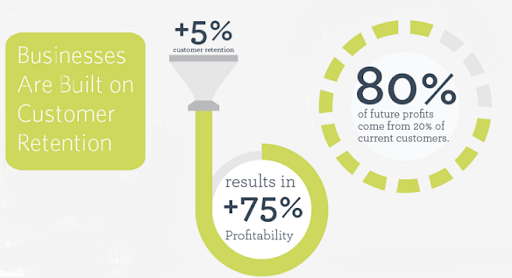
Image Sourced from constantcontact.com
4. It improves your SEO and web traffic
Small businesses need consistent website traffic more than larger enterprises. An increase in organic traffic reduces your spending on paid ads, and SEO (search engine optimisation) can do wonders for your brand’s visibility. More content means more pages for search engines to index and more results to show to searchers.
Plus, if you provide plenty of exciting content, your visitors will spend longer on your website – which Google takes as a sign of value. If you increase time on site by as little as three seconds, you could move one position higher in the search results.
Just having a ton of content isn’t enough. However – you’ve got to optimise it for SEO by analysing the keywords people are searching for. For example, if you were promoting small office phone systems, you’d check out recent searches on that topic and make sure you include the most popular keywords in your content targeting phone solutions for small businesses.
5. It supports your other marketing efforts
Another benefit of content marketing is that it aligns with and supports all other aspects of your omnichannel marketing strategy, from email campaigns to social media to word of mouth.
All your content must be engaging, but small businesses may not have the time or resources to keep coming up with new ideas. The good news is that you can use existing content differently, and you may consider adding this to your business systemisation. For example, if you’re running an email drip campaign to nurture cold leads, you can send them a blog, a video demonstration, or a comparison guide they won’t have seen before.
Great content is also a way to boost your social media efforts. When people enjoy spending time on your website, you can encourage them to become followers on social media – where they’ll be able to access extra content and fully engage with the brand. They’ll also promote your content through likes, comments, and shares.
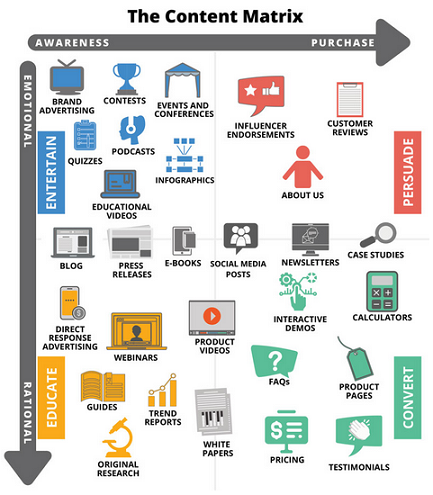
Image Sourced from business2community.com
Further tips for top-quality content marketing
Know your audience
Get to know your target customers with thorough research and analysis and encouraging feedback. Learn their pain points, special interests, and how they perceive value. Through your SEO efforts, you’ll see what questions they are asking, and you can write with them in mind.
Mix content styles
Keep your audience entertained with various styles, including long-form articles, listicles, comparison pieces, and news roundups. Video has become the most commonly used format in content marketing, and infographics are good too.
Tantalising subscriber-only content should help you to attract more signups, which gives you more customer information to work with. Include a call-to-action to boost the conversion rate.
Use your expertise
The advice to budding authors is to “write what you know”, and the same can be applied to content creation. As a business owner, you have inside knowledge of your industry, so tap into that – write about how you started out, what you’ve learned, and your tips for success. You could make it even more personal by using a video format.
Repurpose content
This is a winner for small businesses on a limited budget, as you don’t have to pay for new articles. You can rewrite existing content to keep it fresh, such as updating it with the latest stats or remixing a listicle into a video or infographic. Content team collaboration is important to make sure your ideas don’t overlap.
Use your customers (in a good way)
User-generated content is the ultimate freebie. Use your customer satisfaction metrics to find the people who love your brand, and ask them to write reviews and testimonials or contribute to customer stories. This helps with your social proof, as the views of real customers are unbiased.
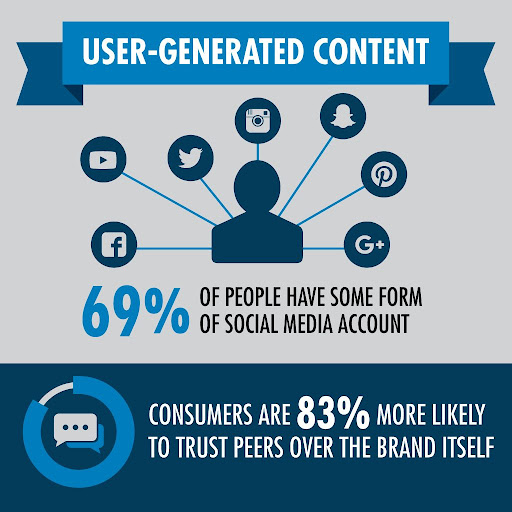
Image Sourced from wishpond.com
Keep publishing
If you want people to engage with your brand, keep putting yourself out there. In your task tracking software, set up a schedule for creating and posting content to ensure it happens regularly, and then promote the heck out of it.
Don’t worry – there are lots of free ways to do this! Email your list of subscribers, share on social media and online communities (and encourage re-shares), and set up reciprocal links with other bloggers. Content marketing helps you generate 97% more backlinks, which is also a sign of trust in Google.
Invest in content marketing and grow your business
As a small business, you should do everything possible to boost brand awareness and build lasting customer relationships.
Content marketing is a simple and affordable way to engage readers with valuable, relevant information – and send plenty of organic traffic your way.

